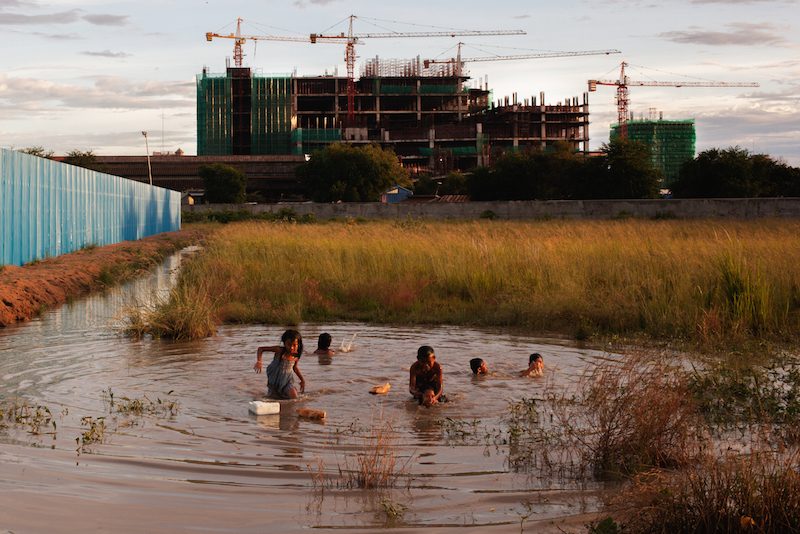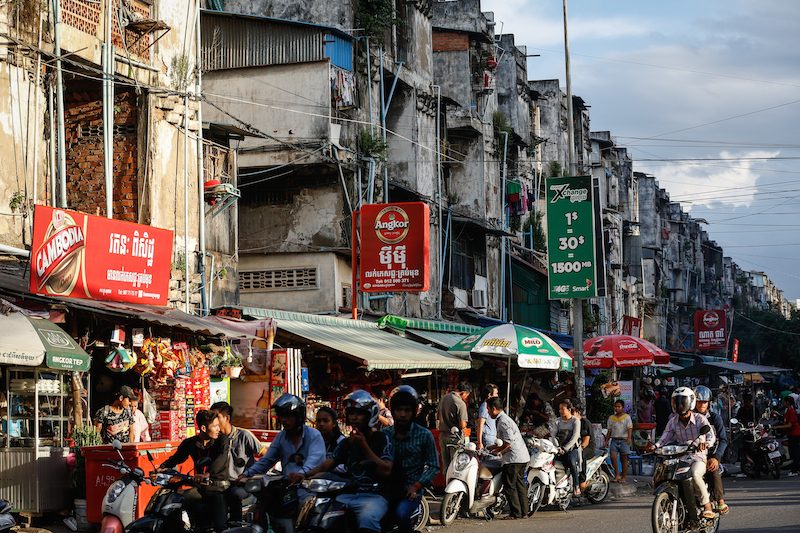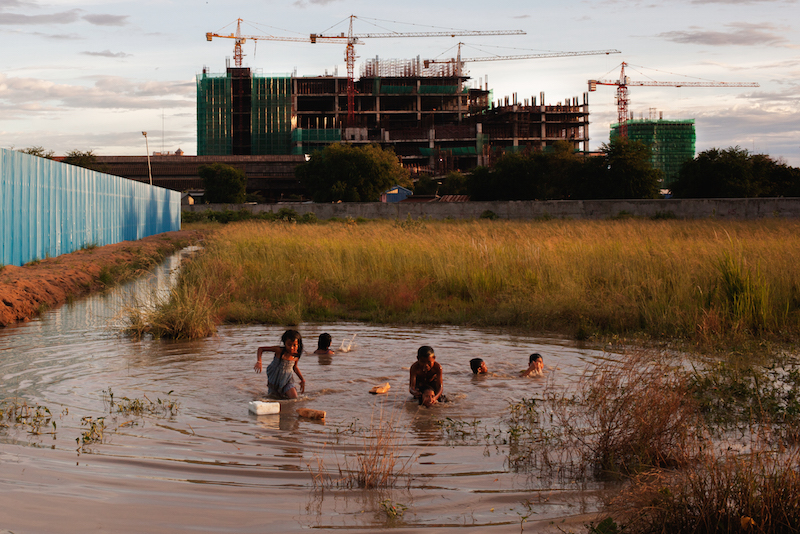Vote-seeking politicians around the world are no strangers to making—and later breaking—promises to their constituents. But in Phnom Penh, those weary of ongoing land disputes are particularly wary of the solutions being offered this election cycle.
Those fearful of more empty promises—claims never resolved, new homes never built, compensation never received—are concerned they will once again be pawns in an ongoing political game.

“The people of land conflict, it’s like they have been kidnapped for political reasons,” said Vann Sophath, the business and human rights project coordinator for the Cambodian Center for Human Rights.
In Phnom Penh alone, about 98,000 people are affected by land disputes, according to Mr. Sophath. For many, their cases have received so much publicity over the years that their neighborhood has become synonymous with land strife: Boeng Kak, Borei Keila, and the White Building.
As Sunday’s commune elections approach, the first local ballot in five years, the municipal government is again ramping up its efforts to address the ills facing the urban poor and win their votes.
On May 3, City Hall announced an upcoming capitalwide survey that would lead to “qualified” urban impoverished people receiving land titles.
Days prior, residents of the city’s dilapidated White Building—a low-income housing block soon to be razed and rebuilt as a modern high-rise—said they were given gifts and money at a meeting with government officials and explicitly asked “to vote for the CPP, and then they will solve all our problems,” one attendee said.
On Thursday, Prime Minister Hun Sen reflected on protests that turned violent in Meanchey district’s Stung Meanchey commune after the last general election, warning against any repetition. The next day, 423 households in the commune that have been in a land dispute for upward of two years were promised land titles—and “no eviction”—upon the completion of developments to a faulty canal they live
beside.
Can these communities’ votes be swayed by a promise of land titles that have not yet been delivered—especially in light of past failures by the same government to follow through on earlier promises?
When Phnom Penh governor Pa Socheatvong was inaugurated in May 2013, he promised to be a source of change for the city and said he would resolve existing land disputes.
He said at the time that he would “continue to solve the remaining problems such as public order and traffic problems…and some remaining land disputes such as in the Boeng Kak lake area, the Borei Keila area and the Thma Koul community and reservoirs.”

By the following year, critics said his promises were likely a ploy to gain popularity ahead of the July 2013 general elections. To this day, members of the three communities say they are waiting for satisfactory land resolutions. On Monday, representatives from each spoke with officials at the National Assembly, asking that the task of granting land titles be transferred to the Land Management Ministry, as City Hall had provided insufficient solutions, according to Im Srey Touch, a 42-year-old from the Boeng Kak community.
The sheer number of people affected by land disputes is “still a problem—and also affects the election,” said Mr. Sophath of the human rights center. “When they’re angry with the problem, even if they’re a ruling party follower, they’ll say…if their land is not resolved, they will elect other parties.”
Neither Mr. Socheatvong nor CPP spokesman Sok Eysan could be reached for comment. City Hall spokesman Met Measpheakdey denied any political motivation behind the recent land announcements.
“This job is not connected to the political side,” he said. “The political party is a separate party.”
The government handles land titles on behalf of land management authorities, “and with that we always think about the citizens,” he said. “Whatever we do and whatever we are able to arrange, we will do for them.”
Land Management Ministry spokesman Seng Lot declined to comment, referring questions back to Mr. Measpheakdey.
But land rights experts and analysts said the moves were a clear sign of efforts to shore up support for the party.
“The timing tells the story,” said Sebastian Strangio, author of ‘Hun Sen’s Cambodia,’ via email. “With just about everything the government does for the people, a quid pro quo is baked in: benefits in exchange for loyalty.”
“This initiative seems like a last-ditch attempt by the CPP to address public concerns about urban land tenure security before the commune elections,” he said. “Hand-outs in exchange for votes is a longstanding tactic of the CPP, and this land-titling promise sits on a spectrum running from Hun Sen’s school and pagoda openings to the hand-outs of rice, dried noodles, and kramas that still forms the basis of the party’s electoral ‘campaigns’ in rural areas.”
Soeung Saran, executive director of housing rights group Sakmakum Teang Tnaut, said the recent City Hall announcements were an effort “to show that the government cares about the livelihoods of the people” before they take to the ballots.
“The question is why they have not taken the measures in the early stage,” he said. “Why is it approaching election time and now they are getting started.”
Mr. Sophath of the human rights center echoed that interpretation.
“Before elections, we observe that the government and also the authorities, they like to show their commitment to resolve the problems, especially land issues,” he said.
But CNRP Vice President Mu Sochua said the promises were empty, once again.
“Offering solutions during election campaign is not new,” she said in an email. “Violations of people’s land rights, forced relocations, expulsion by force have affected thousands of people in the urban communities for years.”
For recent promises to have any influence on votes, said Eang Vuthy, director of Equitable Cambodia, a local NGO that helps evictees, City Hall needs to provide documentation to prove it will follow through with the announcements.
“Now is election time, so possibly the political party gives a lot of promises to the people,” he said. “In order for the people to trust in the promise, it has to be an official kind of currency.”
“There is a history of promises that were not kept,” he added.
A survey released in December by STT backed up this position. The group interviewed Phnom Penh residents affected by developments dating back to 1990.
They said they had been largely left in the dark about the development that ousted them, that no single government body was held accountable when they filed legal complaints and that their livelihoods had taken a significant hit.
Voters’ political leanings were unlikely to be changed so late in the game, political analyst Lao Mong Hay said.
“I’m not so sure it will be effective,” he said. “I think that people have made it clear—many have made up their minds already.”
Pen Rainsy Khemra, a 27-year-old English teacher who lives on the third floor of the White Building, agreed. Despite the government’s call for residents to vote for the ruling party after settling compensation deals for their property, any influence on the vote would be minimal, she said.
“I don’t think it’s a big decision or big influencer because the compensation is not really good enough,” he said.
For many, like Ms. Srey Touch of Boeng Kak, the community had no hope remaining for the ruling party’s help in its ongoing land dispute.
“If we look at the current situation, the authorities have no good will to solve the problem for us, so we must change [our vote] because we are victims that no one is taking care of,” she said.
But for some, the recent promise of land titles is exactly what it takes to ensure their vote for the CPP.
“The governor promised to give land titles to us, so I am going to vote for the CPP,” said Seng Sinat, 33, one of the canal-side community members in Stung Meanchey commune.
“If they break their promise, I will reconsider in the future.”
(Additional reporting by Buth Kimsay)




